Nationalism Class 11 Political Science
| Table of contents |

|
| Introducing Nationalism |

|
| Nations and Nationalism |

|
| National Self-Determination |

|
| Nationalism and Pluralism |

|
Introducing Nationalism
- Nationalism has played a significant role in shaping history over the past two centuries. It has been a source of both unity and division among people, leading to liberation from oppressive rule as well as causing conflicts, bitterness, and wars. Throughout its evolution, nationalism has undergone many phases.
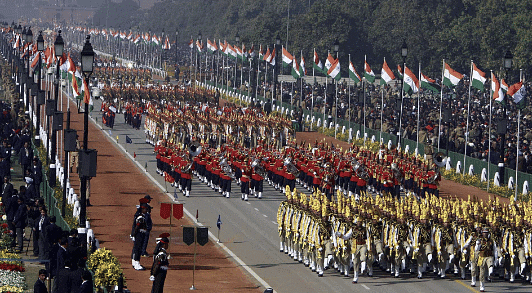
- In the 19th century, nationalism led to the unification of small kingdoms into larger nation-states in Europe, resulting in the formation of present-day Germany and Italy.
- However, it also contributed to the disintegration of large empires like the Austro-Hungarian and Russian empires in early 20th century Europe, as well as the British, French, Dutch, and Portuguese empires in Asia and Africa.
- The process of redrawing state boundaries is an ongoing phenomenon. Even today, there are nationalist struggles in many parts of the world that pose a threat to existing states.
- Such separatist movements have emerged among the Quebecois in Canada, the Basques in northern Spain, the Kurds in Turkey and Iraq, and the Tamils in Sri Lanka, among other regions.Question for Chapter Notes: NationalismTry yourself:Which of the following is an example of a nationalist struggle based on the information provided?View Solution
Nations and Nationalism
A nation is more than just a random group of people; it has unique features that set it apart from families, tribes, and other social groups.
Differences from Families and Tribes
- Families: In families, members know each other personally and have direct relationships.
- Tribes and Clans: These groups are connected through marriage and family ties, which can often be traced.
- Nations: As part of a nation, we may never meet most of our fellow citizens, and we don’t need to have family connections with them.
Diversity Within Nations
- Nations are often thought to be made up of people who share things like language, religion, or ethnicity. However, this isn’t always true.
- For example, Canada has both English and French speakers.
- India is home to many languages and cultures, showing that a nation can be diverse in these aspects.
Imagined Communities
- A nation is often described as an "imagined community." This means that the members may not know each other personally, but they share common beliefs and aspirations.
- People form connections based on their ideas and feelings about their nation.
Shared Beliefs
A nation is formed through shared beliefs, not physical things like mountains or rivers.
1. Belief-Based Identity
- Nations exist because people believe in them. They aren’t tangible objects that we can see or touch.
2. Collective Identity
- Referring to a group as a nation is about their shared identity and future goals, not about their physical traits or behaviors.
3. Comparison to a Team
- A nation is like a team: It’s made up of people who work or play together and see themselves as a group.
- If team members didn't think of themselves as a collective, they would just be individuals doing their own thing.
4. Sense of Belonging
- A nation exists when its members believe they belong together and share common aspirations.
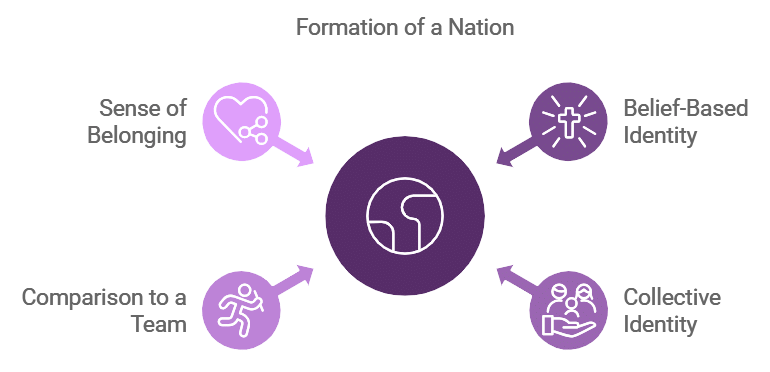
History
- People who identify as a nation embody a sense of continuing historical identity.
- The historical continuity and unity of a civilization is the basis of a nation.
- Nationalists in India claimed that India has had a long and continuing history as a civilization and invoked its ancient cultural heritage and achievements.
Territory
- Nations identify with a particular territory that they claim as their own.
- Living together on a particular territory over a long period of time gives people a sense of their collective identity.
- The aspiration for a homeland has been a major cause of conflict in the world since more than one set of people may lay claim to the same territory.
Shared Political Ideals
- A shared vision of the future and the collective aspiration to have an independent political existence distinguishes groups from nations.
- A set of political values and ideals is the most desirable basis of a political community or a nation-state.
- In a democracy, members of the political community are bound by a set of obligations to each other.
 |
Download the notes
Chapter Notes: Nationalism
|
Download as PDF |
Common Political Identity
- Many individuals consider a shared cultural identity, such as a common language or ancestry, to be a unifying factor for a nation.
- Celebrating the same holidays and festivals and valuing the same symbols can create a sense of community. However, it can also put democratic values at risk.
- This is because major religions are internally diverse, with various sects differing in their interpretations of religious texts and norms. Additionally, most societies are culturally diverse, with people of different religions and languages residing in the same area.
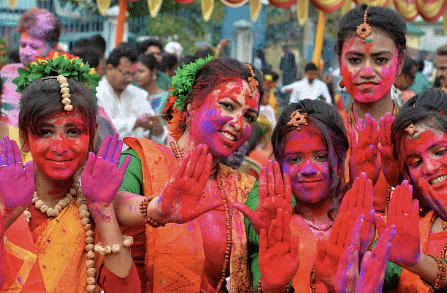
- Therefore, it is preferable to conceptualize the nation in political rather than cultural terms for these reasons. In other words, democracies should prioritize and anticipate loyalty to a set of values, which may be enshrined in the country's Constitution, rather than attachment to a specific religion, race, or language.Question for Chapter Notes: NationalismTry yourself:What is the basis of a nation according to the text?View Solution
National Self-Determination
Self-Governance
- Nations, unlike other social groups, want the ability to govern themselves and shape their own future. This is known as the right to self-determination.
Recognition
- When a nation claims this right, it seeks recognition from the international community as a distinct political entity or state.
Common Identity
- These claims usually come from people who have lived together in a specific area for a long time and share a common identity.
Cultural Protection
- Sometimes, nations want self-determination to protect their culture, aiming to create a state that values their unique traditions.
Historical Context
- In the 19th century, Europe saw the idea of "one culture - one state" gain popularity. This idea influenced the reshaping of borders after World War I, particularly through the Treaty of Versailles.
Challenges of Boundary Changes
- While new states were formed, it was impossible to meet all self-determination demands. The rearrangement of borders led to mass migrations and many people were displaced from their homes.
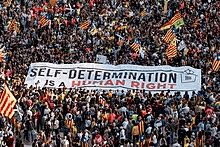
Consequences of Restructuring
- The efforts to create separate nation-states for distinct cultural groups resulted in significant suffering, including communal violence and the displacement of millions.
Diverse Communities
- Most states have multiple ethnic and cultural communities living within their borders. Often, these communities are minorities and face disadvantages.
Accommodating Minorities
- There is a challenge in treating these minorities as equal citizens, highlighting the need for better accommodation.
Political Recognition
- A positive outcome of these developments is the political recognition of groups that see themselves as distinct nations, wanting to govern themselves and shape their futures.
National Liberation Movements
- In Asia and Africa, national liberation movements sought the right to self-determination while fighting against colonial rule, aiming for dignity, recognition, and the protection of their collective interests.
Struggles for Independence
- Many nationalist movements aimed to bring justice and prosperity but faced challenges in achieving political independence for all cultural groups, leading to ongoing issues like migration, border conflicts, and violence.
Paradox of Independence
- Countries that fought for independence often struggle with minority groups within their borders claiming the same right to self-determination.
Current Dilemma
- Today, every state faces the dilemma of how to handle self-determination movements, raising questions about the right to national self-determination.
Focus on Democracy
- Solutions may not lie in creating new states but in making existing states more democratic and equitable, allowing people of different cultural and ethnic backgrounds to coexist as equal citizens.
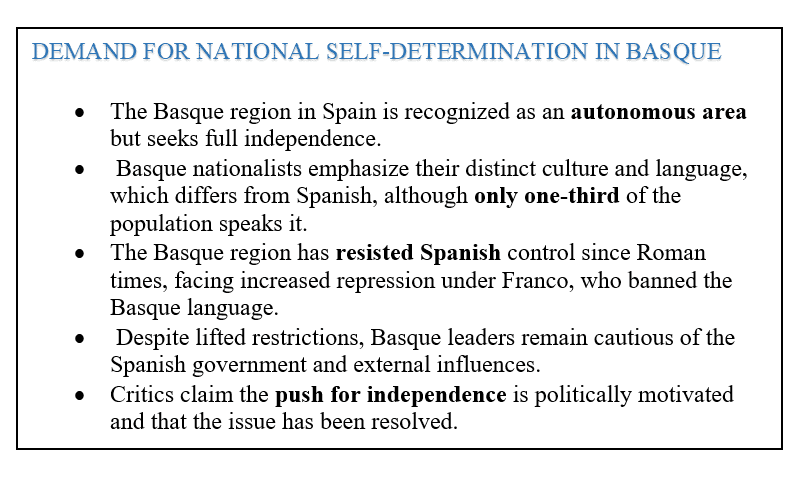
Nationalism and Pluralism
Moving Beyond One-Culture-One-State
- When we abandon the idea of one culture for one state, we need to find ways for different cultures to thrive together.
Protection of Minority Communities
- Many democratic societies now focus on recognizing and protecting the identities of cultural minority communities.
- The Indian Constitution has detailed provisions to protect the rights of religious, linguistic, and cultural minorities
Group Rights
- Various countries grant rights to minority groups, including:
(i) Constitutional protections for their languages, cultures, and religions.
(ii) Rights to representation in legislative bodies and state institutions.
Justification for Rights
- These rights help ensure equal treatment and legal protection for minority group members, as well as safeguard their cultural identity.
Inclusive National Identity
- The national identity should be defined in an inclusive way, recognizing the contributions of all cultural communities.
Continued Aspirations
- While recognition and protection may address some aspirations, some groups may still seek separate statehood.
- This desire for nationalism persists even in an age of globalization.
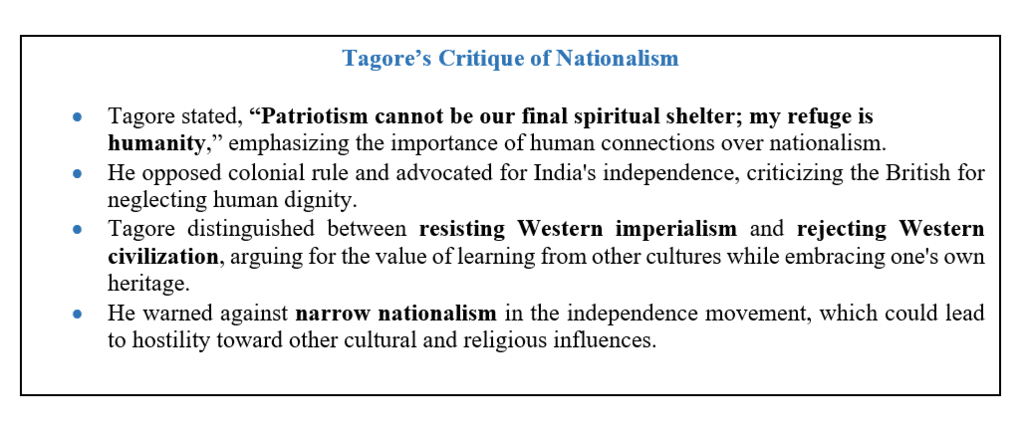
Conclusion
In conclusion, while the right to national self-determination has traditionally been linked to the idea of independent statehood for distinct cultural groups, granting every group this status is both impractical and potentially harmful. Instead, we should focus on recognizing and protecting the diverse identities within a state through democratic rights.
As we navigate a world rich in cultural identities, it's crucial to honor these identities without allowing them to foster division or conflict. Each individual embodies multiple identities—such as those based on gender, caste, religion, and language. When people feel free to express all aspects of their identity, the demand for exclusive political recognition may diminish.
Imagine a vibrant tapestry woven from many threads, each representing a unique identity. Our goal is to create a society where all these threads are celebrated and respected, contributing to a beautiful, cohesive whole. By embracing diversity and ensuring everyone has a voice, we can build a united community that thrives on its differences.
|
476 videos|360 docs
|
FAQs on Nationalism Class 11 Political Science
| 1. What is nationalism and how does it impact the identity of a nation? |  |
| 2. How does national self-determination relate to nationalism? |  |
| 3. Can nationalism coexist with pluralism in a society? |  |
| 4. What are some positive and negative effects of nationalism? |  |
| 5. How has nationalism evolved in the modern world? |  |




















